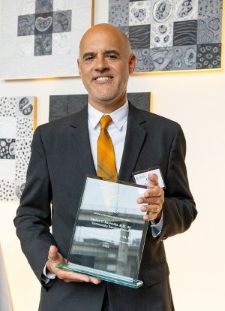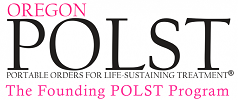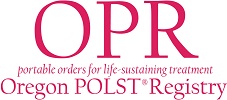Since 1989 the OHSU Center for Ethics in Health Care has partnered with practitioners of all health professions regionally and nationally to be a leading voice for compassionate health care. The Center is committed to providing an ethical perspective of compassion, respect and justice to ensure that such care is delivered wisely and well.
Recent Announcements

We are excited to announce that Dr. Fabrice Jotterand has been named the next Director for the Center for Ethics in Health Care! The announcement can be found here:
https://news.ohsu.edu/2025/02/27/dr-fabrice-jotterand-named-director-for-the-center-for-ethics-in-health-care
We look forward to celebrating together Dr. Jotterand as the second Cornelia Hayes Stevens Endowed Chair once he is on campus.
Please check out his recent podcast: The Philosophical Pulse: Open Discourse on Medicine and Medical Education by Fabrice Jotterand PhD, MA & James N. Woodruff MD

Congratulations to Dr. Cliff Coleman for receiving the Walter C. Reynolds Community Service Award! More info about the award can be found HERE
Upcoming Events
Please also note that all times referenced below are in pacific time (PT).
Friday, February 6, 2026 at 12:00 PM – the Oregon Bioethics and Humanities Colloquium presents Clara Bosco, MD.
Tuesday, March 3, 2026 at 8:00 AM – The Madeline Brill Nelson Speaker Series in collaboration with OHSU Department of Medicine Grand Rounds presents James N. Woodruff, MD
Wednesday, March 11, 2026 at 8:30 AM - TalkOregon CME Workshop (virtual). Register here.
Friday, May 1, 2026 at 7:00 AM - the Annual Kinsman Bioethics Conference presents Tenzin Wangmo, PhD as the Keynote Speaker. Location at Westside Commons Hillsboro: 801 NE 34th Ave, Hillsboro, OR 97124.
Tuesday, May 12, 2026 at 1:00 PM - TalkOregon CME Workshop (virtual). Register here.
Friday, June 12, 2026 at 12:00 PM – the Oregon Bioethics and Humanities Colloquium presents Fabrice Jotterand, PhD, MA.
April 17 - 18, 2025 - 2025 Kinsman Bioethics Conference will be held in Bend, OR!
Friday, May 2, 2025 at 8 AM - Oregon Bioethics and Humanities Colloquium (OBHC) presents: Teneille Ruth Brown, JD, James I. Farr Professor of Law, The University of Utah. This will be a virtual event.
Friday, May 16, 2025 at 8 AM - Oregon Bioethics and Humanities Colloquium (OBHC) presents: “Malaria Eradication Attempts in Africa: Historical Lessons on Good Intentions, Unintended Consequences, and Unresolved Ethical Questions” by Melissa Graboyes, PhD, Associate Professor, University of Oregon, Department of History & Global Health Program. This will be a virtual event.
Friday, June 6, 2025 at 8 AM - Oregon Bioethics and Humanities Colloquium (OBHC) presents: Barbara Sestak, FAIA, Professor, School of Architecture, Portland State University. This will be a virtual event.
Wednesday, October 15, 2025 at 12:00 PM – The Oregon Bioethics and Humanities Colloquium (OBHC) Kick Off in collaboration with OHSU Pediatric Grand Rounds presents Mary Ann Abrams, M.D., MPH
Thursday, October 16, 2025 at 11:30 AM - Register for the 2025 Health Literacy Symposium here with Mary Ann Abrams, M.D., M.P.H. as the Keynote Speaker.
Friday, November 7, 2025 at 12:00 PM - the Oregon Bioethics and Humanities Colloquium presents "Confronting Bias, Power, and Oppression in Pediatric Ethics: Sharing A Novel Tool for Pediatric Ethics Consultation" by Sarah Porter, MSW.
Friday, December 12, 2025 at 9:00 AM - TalkOregon CME Workshop (virtual). Register here.
Friday, December 12, 2025 at 12:00 PM – the Oregon Bioethics and Humanities Colloquium presents “Medical Mistrust: Conceptual Insights and Empirical Challenges” by Alyssa Newman, PhD. View join, click here.
Friday, January 9, 2026 at 12:00 PM – the Oregon Bioethics and Humanities Colloquium presents Drew Grabham, LCSW.
Recent Publications
Coleman C, Birk S, Stowers K, Mullowney C, Chisholm-Burns M. The hidden curriculum undermines teaching about health literacy and clear communication, promoting inequities in care. Social Science and Medicine, 2025. https://authors.elsevier.com/sd/article/S0277-9536(25)00876-7
Padela, A.I., Hayek, R., Tabassum, A., Jotterand, F. & Qadir, J. (2025). “Assisting, Replicating, or Autonomously Acting? An Ethical Framework for Integrating AI Tools and Technologies in Healthcare”, Bioethics https://doi.org/10.1111/bioe.70019
Shah, R. & Jotterand, F. (2025). “Large Language Models in Neurology Treatment Decision-Making: Current Evidence”, Journal of Medical Systems 49:115 (2025). https://doi.org/10.1007/s10916-025-02254-4
Disher N, Dieckmann NF, Case JR, Rubim F, Eden KB, Golden SE, Matlock DD, Coleman C, Lyons KS, Saha S, Slatore CG, Vranas KC, Sullivan DR. Improving lung cancer decision-making using a conversation tool (iDECIDE): a stepped wedge pragmatic clinical trial. Future Oncol. 2025 Mar 18:1-12. doi: 10.1080/14796694.2025.2475733. Epub ahead of print. PMID: 40098532.
Ketterer, B., Dingfield, L., Stowers, K. H., Morrison, K., Bailey, A., Flint, H., Buckholz, G., Morrison, L. J., Yang, H., & Berns, S. (2025). AAHPM Assessment Workgroup: Hospice and Palliative Medicine Fellowship Assessment Needs and Directions. Journal of Pain and Symptom Management, 69(3), e220-e227. https://doi.org/10.1016/j.jpainsymman.2024.12.009
Jotterand, F., Derse, A., Spellecy, R., Stawski, C. & Kalet, A. (2025). “Practical Wisdom, Clinical Judgments, and the Agential View”, Journal of Medicine and Philosophy 50(2): 147-158.
Newsletter
To read the November issue of the newsletter, click HERE.
Impact Report
We remain full of gratitude to all those who have made this work possible. Thank you! To learn about the accomplishments and achievements of the Center for Ethics in Health Care, click HERE.
Land Acknowledgement
We acknowledge the original inhabitants and traditional village sites of the land Oregon Health & Science University is occupying and built upon: the Multnomah, Kathlamet, Clackamas, Tumwater, Watlala bands of the Chinook, the Tualatin Kalapuya, Molalla, Wasco and many Indigenous nations of the Willamette Valley and Columbia River Plateau. We take this opportunity to thank the original caretakers of this land - past, present, and future.
Contact Us
Phone & Email
(503) 494-4466
ethics@ohsu.edu
Office Hours
Monday – Thursday: 8:00 AM – 4:30 PM
Friday: Closed
Mailing Address
OHSU Center for Ethics in Health Care
3181 SW Sam Jackson Park Rd. UHN86
Portland, OR 97239

